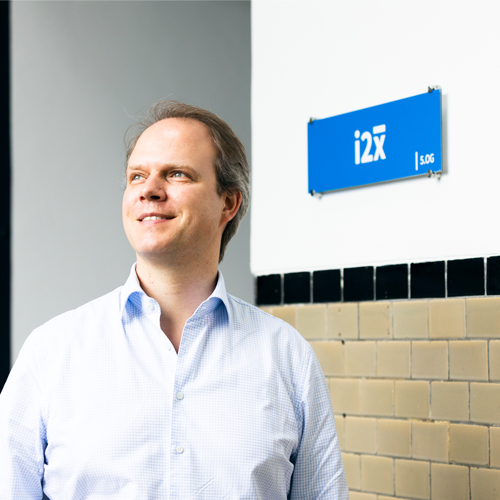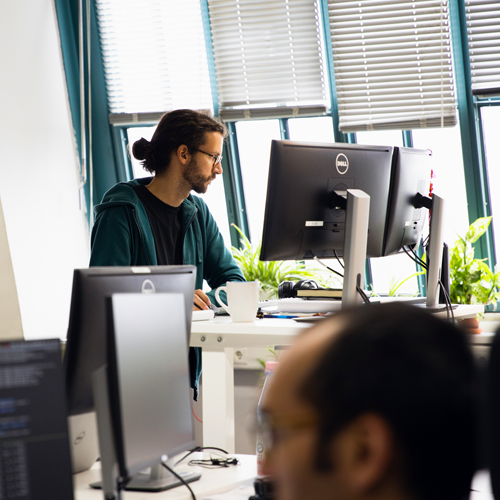Is your job really safe from AI (and what can you do to protect it)?
23 December 2019

Michael Brehm, founder of human augmentation software company i2x, believes we should welcome advanced machine learning in the workplace, not fear it. Just don’t call it AI…

Is there any job or industry that’s safe from the rapid rise of AI? Headlines would suggest that for most of us, our working days as we know them are numbered.
The best bet, according to the data, is to run a pub. But if pulling pints and taming rowdy locals doesn’t appeal, Michael Brehm has a more positive outlook on the integration of advanced machine learning in the workplace.
Brehm should know — a pioneer of the German startup scene, he’s sold companies to Google and eBay, and is cited as the go-to man for predicting the next big wave of innovation in tech. Right now, this means the 39-year-old entrepreneur spends a lot of time on the subject of AI.
His current venture, i2x, is on the cutting edge of these developments, using machine learning to augment human-to-human verbal interaction for sales and customer support. Credit Suisse predicts it’s a business that could be worth in excess of $30bn by 2030.
On a visit to the i2x HQ in Berlin, we asked Brehm to share — in his own words — some guidance and positive thinking about the future of work, and quell any latent fears we might have of being usurped by an algorithm. (Interview edited for clarity and length)

I’m a big believer in human plus machine. Machines are very good at analysing huge amounts of data and making suggestions. Humans are very good at putting this into context, asking the right questions and processing it.
If you put man and machine together, you get a very powerful outcome. That’s really what we’re trying to do at i2x — build human-plus-machine software which augments the human.
People fear technology too much. What normally helps is embracing it, thinking about it as a tool that makes us better, more efficient, smarter. Then thinking, “How can I use it to really upgrade myself?”
It’s important to acknowledge that the world is not in a stable state. It’s going to change — and I don’t just mean in a political way. We have to learn and adapt more than ever before. For people who may not have grown up with the internet, that can be difficult.
Companies that invest a lot into technology do so much better than those that try to preserve the status quo. You hear, “Oh yes, but it’s an expenditure” and “All these different pieces of hardware or software, will they really pay out?” The statistics show that yes, technology pays out.

Technology can actually help people keep their jobs. I might not be doing the same task I’ve done in the past, but technology makes a company better and more productive. If you learn and embrace it, you’re going to be a great asset.
We already live in a world where technology and robots are an integral part of human life. Most of the time, it comes so naturally that we’re not even aware of it.
Nobody likes to lift 100-kilo pieces every day. This sort of task has been taken away by automation and now, there’s more skilled labour in factories.
One reason AI gets negative press is fear and a lack of knowledge, usually related to the loss of jobs. We actually had the same discussion about robots 20 years ago, except it’s now called AI.
The fundamentally wrong assumption is that the amount of work we have is limited — that what we do currently is all the work that can be done.

I’m convinced we’re not going to see a dramatic rise in unemployment. You don’t see the counter calculation of how many new jobs are going to be created, only how many are going to be made obsolete.
If you look at nursing homes or hospitals there’s a huge shortage of people. A real benefit would be to have robots taking on a lot of the tasks, then a nurse becomes responsible for maybe 20 robots on the floor instead of trying to do everything him or herself. That way nurses could care for their patients much more on a personal, emotional level.
There will be a tremendous number of new roles and new tasks. Take data analytics and interpretation — it’s a very broad field that’s needed in many different places and industries.
People ask, “What are going to be the jobs out of AI that will employ the millions, not just some specialists?” One area is labelling [the manual curation of data by humans on AI applications]. Extremely important algorithms are only as good as the data you provide.
The number of engineers we need will increase dramatically too.
If you look back at the last 10-15 years, the development of internet technology has been mindblowing. I think that development is only going to accelerate.

With a rosy future of man and machine laid out in front of us, we asked Brehm to explain a little more about i2x, starting with an express lift elevator pitch for a concept some may struggle to grasp…
We help employees at companies to communicate better with their customers on the phone. That would be my very short explanation.
The longer explanation would be that we record calls from customer support and telesales agents. We send them to the cloud, transcribe them, analyse them, and then in real time, push back information to the screens of the agents so they know what they should say or shouldn’t say.
Giving suggestions like ‘now mention this product’ or ‘now ask this question’ makes for better interactions with the customers of the companies.
At my old company, we had 10,000 employees in 30 countries out of which 2,500 were telesales agents. It was incredibly hard for my team to get consistent quality and to have our agents really understand what we wanted them to do.
What we’re building is augmentation software to help humans do their job better.

I haven’t heard of the i2x technology being used to say, “Should we let go of someone or not?” because a manager knows that already. It’s really about how we can improve people who are willing to learn and better themselves.
If the majority of a manager’s time is spent listening to bad sales or bad customer service calls, it’s like a punishment, not a job.
You can take this out or automise it with the listening analytics. Then you get a data set, which enables the team leader to ask the right questions and say, “This is interesting, why does he or she do this?”
We’re currently focused on large companies. Utilities, financial institutions, telecoms — any businesses that have a lot of people talking with customers on the phone.
The one-to-one human-to-customer relationship on the phone is our focus right now, but from a technology stack perspective, it’s about analysing conversations and interactions so we can apply it to many other fields theoretically and hopefully, improve everybody’s lives.



